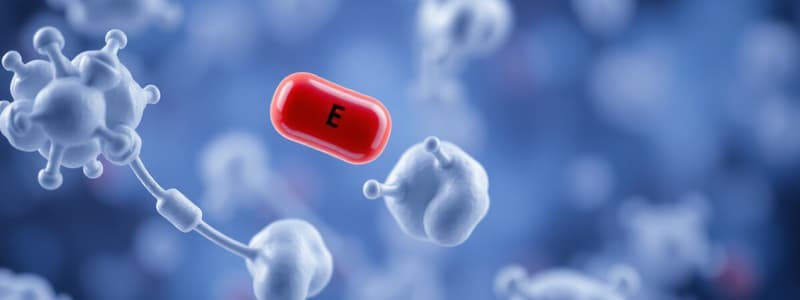Podcast
Questions and Answers
The phenomenon of drug metabolism whereby the concentration of a drug is greatly reduced before it reaches the systemic circulation is known as ______.
The phenomenon of drug metabolism whereby the concentration of a drug is greatly reduced before it reaches the systemic circulation is known as ______.
first pass effect
The process of removing an absorbed drug from the body is called ______.
The process of removing an absorbed drug from the body is called ______.
excretion
Drugs that prolong the action of medications can do so by increasing ______ protein binding.
Drugs that prolong the action of medications can do so by increasing ______ protein binding.
plasma
Half-life (t ½) is the time it takes for the plasma concentration of a drug to be reduced to ______ %
Half-life (t ½) is the time it takes for the plasma concentration of a drug to be reduced to ______ %
In steady state, the amount of drug administered equals the amount of drug ______.
In steady state, the amount of drug administered equals the amount of drug ______.
Biotransformation refers to the chemical alteration of a drug in the body's ______.
Biotransformation refers to the chemical alteration of a drug in the body's ______.
Phase-I reactions involve the conversion of the parent drug to more polar metabolites through ______.
Phase-I reactions involve the conversion of the parent drug to more polar metabolites through ______.
Phase-II reactions are also known as ______ reactions.
Phase-II reactions are also known as ______ reactions.
Glucuronide conjugation is an important Phase-II reaction that often involves ______ acid.
Glucuronide conjugation is an important Phase-II reaction that often involves ______ acid.
Decreased intensity and/or duration of action of drugs may occur due to microsomal enzyme ______.
Decreased intensity and/or duration of action of drugs may occur due to microsomal enzyme ______.
Tolerance can occur when a drug induces its own ______.
Tolerance can occur when a drug induces its own ______.
The accumulation of bilirubin in congenital nonhaemolytic jaundice is addressed by hastening its clearance using ______.
The accumulation of bilirubin in congenital nonhaemolytic jaundice is addressed by hastening its clearance using ______.
Cushing's syndrome manifestations may be reduced by enhancing degradation of adrenal ______.
Cushing's syndrome manifestations may be reduced by enhancing degradation of adrenal ______.
Study Notes
Biotransformation (Metabolism)
- Biotransformation is the chemical alteration of a drug in the body.
- Phase I reactions involve non-synthetic modifications:
- Oxidation (e.g., barbiturates)
- Reduction (e.g., chloramphenicol)
- Hydrolysis (e.g., procaine)
- Phase II reactions are synthetic or conjugation reactions:
- Involve coupling with endogenous substrates (e.g., glucuronic acid, sulfuric acid)
- Important reactions include:
- Glucuronide conjugation (e.g., chloramphenicol)
- Sulfate conjugation (e.g., steroids)
- Glycine conjugation (e.g., aspirin)
- Acetylation (e.g., sulfonamides)
- Methylation (e.g., histamine)
Enzyme Induction
- Enzyme induction is the increased production of drug-metabolizing enzymes.
- Consequences of microsomal enzyme induction:
- Decreased drug action for drugs inactivated by metabolism (e.g., contraceptives)
- Increased drug action for drugs activated by metabolism (e.g., paracetamol toxicity)
- Tolerance can develop if a drug induces its own metabolism (e.g., carbamazepine)
- Increased metabolism of endogenous substrates (e.g., steroids)
- Intermittent use of an inducer can affect the dosage of other drugs (e.g., warfarin)
Possible Uses of Enzyme Induction
- Congenital nonhaemolytic jaundice: Phenobarbitone can accelerate bilirubin clearance.
- Cushing's syndrome: Phenytoin can reduce symptoms by enhancing adrenal steroid degradation.
- Chronic poisonings: Enzyme induction can accelerate the metabolism of accumulated poisons.
- Liver diseases: Enzyme induction can potentially aid in liver disease management.
Enzyme Inhibition
- Enzyme inhibition is the reduction in the activity of drug-metabolizing enzymes.
- Drugs that inhibit drug metabolizing enzymes include:
- Allopurinol
- Omeprazole
- Erythromycin
- Ketoconazole
- Ciprofloxacin
- Isoniazid
First Pass Effect
- The first pass effect is the significant reduction in drug concentration before reaching systemic circulation due to metabolism in the liver.
- Examples of drugs affected by first-pass metabolism:
- Phenobarbitone
- Aspirin
- Isoprenaline
- Propranolol
- Lidocaine
- Hydrocortisone
- Sulbutamol
Excretion
- Excretion is the process of drug elimination from the body.
Methods to Prolong Drug Action
- Prolonging absorption from the administration site.
- Increasing plasma protein binding.
- Retarding metabolism.
- Retarding renal excretion.
Contraindicated Drugs for Lactating Mothers
- Sulfonamides
- Tetracycline
- Chloramphenicol
- Isoniazid
- Morphine
- Sedative and hypnotic drugs (e.g., diazepam)
- Phenothiazines
- Lithium
- Antithyroid drugs
- Radioactive iodine
- Senna and related purgatives
- Metronidazole
- Anticancer drugs
- Corticosteroids
Clearance
- Clearance is the theoretical volume of plasma from which a drug is completely removed per unit time.
- Calculation: Clearance = Rate of elimination / Concentration of drug in plasma.
Half-Life (t½)
- Half-life is the time required for the plasma concentration or the amount of drug in the body to reduce by 50%.
Steady State
- Steady state is reached when the rate of drug administration equals the rate of elimination.
- Approximately 5 times the half-life is required to reach steady state.
Studying That Suits You
Use AI to generate personalized quizzes and flashcards to suit your learning preferences.
Related Documents
Description
This quiz covers the essential concepts of biotransformation and enzyme induction in drug metabolism. It examines Phase I and Phase II reactions, detailing the various modifications and conjugation processes. Additionally, it highlights the implications of enzyme induction on drug effectiveness and metabolism.



